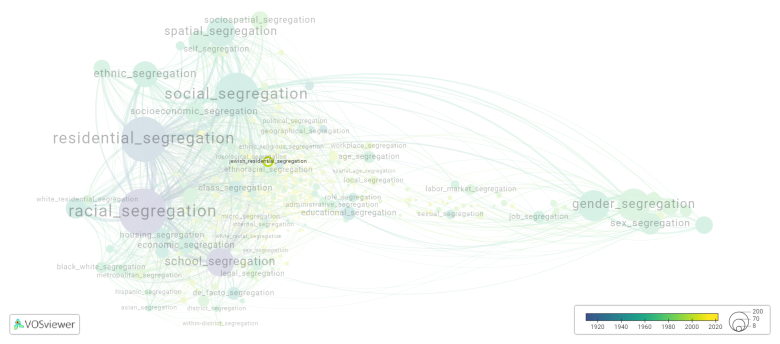Jewish residential segregation: Difference between revisions
(Creating page) |
(Creating page) |
||
| (3 intermediate revisions by the same user not shown) | |||
| Line 16: | Line 16: | ||
It is important to note that while Jewish residential segregation exists, it is not a universal phenomenon. Many Jews live in diverse neighborhoods and communities, integrating with the general population. Additionally, residential segregation is not unique to the Jewish community and can be observed in various religious, ethnic, and cultural groups. | It is important to note that while Jewish residential segregation exists, it is not a universal phenomenon. Many Jews live in diverse neighborhoods and communities, integrating with the general population. Additionally, residential segregation is not unique to the Jewish community and can be observed in various religious, ethnic, and cultural groups. | ||
==See also== | ==See also== | ||
==Related segregation forms== | |||
Jewish residential segregation is frequently discussed in the literature with the following segregation forms: | |||
[[residential segregation]], [[social segregation]], [[ethnic residential segregation]] | |||
[[File:jewish_residential_segregation.png|780x780px]] | |||
This visualization is based on the study [[Segregation_Wiki:About| The Multidisciplinary Landscape of Segregation Research]]. | |||
For the complete network of interrelated segregation forms, please refer to: | |||
* [https://tinyurl.com/2235lkhw First year of publication] | |||
* [https://tinyurl.com/2d8wg5n3 Louvain clusters] | |||
* [https://tinyurl.com/223udk5r Betweenness centrality] | |||
* [https://tinyurl.com/244d8unz Disciplines in which segregation forms first emerged (Scopus database).] | |||
==References== | ==References== | ||
==Notes== | ==Notes== | ||
Latest revision as of 07:17, 16 October 2024
Date and country of first publication[1][edit | edit source]
2011
Canada
Definition[edit | edit source]
Jewish residential segregation refers to the phenomenon of Jews living in concentrated areas or neighborhoods within a city or region. This segregation can occur for various reasons, including historical factors, cultural preferences, economic factors, and religious or safety concerns.
Historically, Jewish residential segregation can be traced back to Jewish ghettos that were established in medieval Europe, where Jews were restricted to living in specific areas. In more recent times, Jewish residential segregation can be seen in cities across the world, such as parts of Brooklyn, New York or certain neighborhoods in London, known for having large Jewish populations.
There are several factors that contribute to Jewish residential segregation. One factor is the desire to live in close proximity to synagogues, kosher food markets, and other Jewish institutions or services. Proximity to these institutions allows for easier observance of religious traditions and cultural practices.
Economic factors also play a role in Jewish residential segregation. Jewish communities often develop their own economy, with businesses catering to the specific needs of the community. This can create a self-sustaining cycle where Jews choose to live in areas with established Jewish businesses and services, further reinforcing segregation.
In some cases, safety concerns have also contributed to Jewish residential segregation. Throughout history, Jews have faced discrimination, persecution, and violence. Concentrating in specific areas can provide a sense of safety and security, as well as a support network within the community.
It is important to note that while Jewish residential segregation exists, it is not a universal phenomenon. Many Jews live in diverse neighborhoods and communities, integrating with the general population. Additionally, residential segregation is not unique to the Jewish community and can be observed in various religious, ethnic, and cultural groups.
See also[edit | edit source]
Related segregation forms[edit | edit source]
Jewish residential segregation is frequently discussed in the literature with the following segregation forms:
residential segregation, social segregation, ethnic residential segregation

This visualization is based on the study The Multidisciplinary Landscape of Segregation Research.
For the complete network of interrelated segregation forms, please refer to:
References[edit | edit source]
Notes[edit | edit source]
- ↑ Date and country of first publication as informed by the Scopus database (December 2023).
At its current state, this definition has been generated by a Large Language Model (LLM) so far without review by an independent researcher or a member of the curating team of segregation experts that keep the Segregation Wiki online. While we strive for accuracy, we cannot guarantee its reliability, completeness and timeliness. Please use this content with caution and verify information as needed. Also, feel free to improve on the definition as you see fit, including the use of references and other informational resources. We value your input in enhancing the quality and accuracy of the definitions of segregation forms collectively offered in the Segregation Wiki ©.
Jewish residential segregation appears in the following literature[edit | edit source]
Omer I. (2011). Spatial configuration of land uses and Arab Jewish residential egregation in Jaffa. Built Environment, 37(2), 199-212. https://doi.org/10.2148/benv.37.2.199
